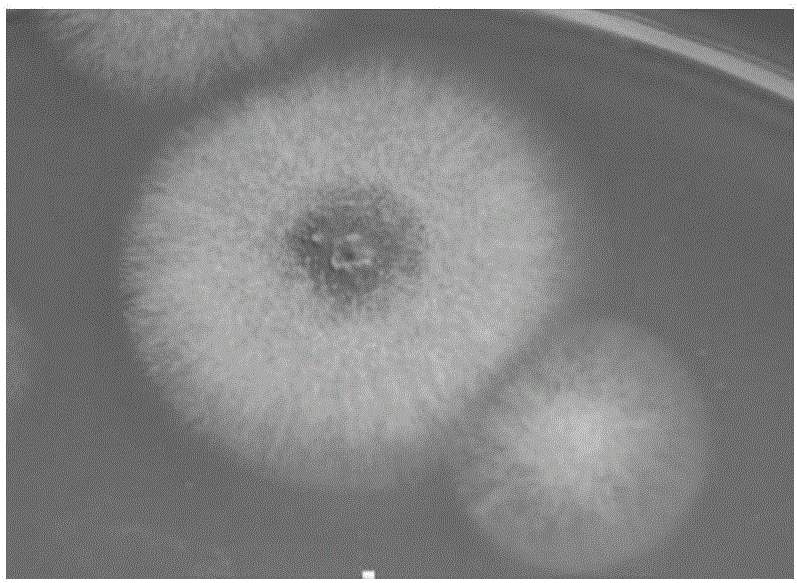Pathogenic fungus for biological control of cockroaches
A technology of microbial strains and microbial mixtures, applied in the direction of microorganism-based methods, microorganisms, fungi, etc., can solve the problems of human and animal hazards, weak virulence, poor host selectivity, long killing time, etc., and achieve control of insect populations , strong selectivity, the effect of protecting natural enemies
- Summary
- Abstract
- Description
- Claims
- Application Information
AI Technical Summary
Problems solved by technology
Method used
Image
Examples
Embodiment 1
[0036] Example 1 Screening of Metarhizium anisopliae (Metarhizium anisopliae)
[0037] (1) Screening process
[0038] The separation and purification are all carried out under the ultra-clean workbench: use the inoculation needle to dip the surface spore powder of the German cockroach and streak it on a 90mm diameter PDA medium coated with 0.5% gentamicin, or use a sterile Grasp the zombies with forceps and gently and quickly shake them on the medium. Put it into a 26℃ constant temperature incubator and cultivate under dark conditions. After 3 days, pick the culture on the medium and transfer it to a new flat PDA medium with a diameter of 90 mm coated with gentamicin. Repeat the operation several times to obtain a pure strain. The isolated pure culture of Metarhizium anisopliae was used to recover the healthy German cockroach, and the same Metarhizium anisopliae was re-isolated from the corpse of the German cockroach that was infected with the disease, and it was determined to be...
Embodiment 2
[0044] Example 2 Determination of virulence of Metarhizium anisopliae (Metarhizium anisopliae) to German cockroach
[0045] Take the conidia of Metarhizium anisopliae on the PDA medium and perform the concentration gradient bioassay, and prepare the spores of Metarhizium anisopliae into 1×10. 5 , 1×10 6 , 1×10 7 , 1×10 8 , 1×10 9 Five spore concentrations of 1 CFU / ml, 0.5% (w / w, accounting for the mass of the spore solution) Tween 80 was added dropwise and mixed for later use. Take sensitive strains of 1-3 instar nymphs, 3-5 instar nymphs, 5-7 instar female and male nymphs, male and female adult German cockroach healthy individuals, each group of 20, and use a micropipette to draw 1μL of spore suspension of different concentrations into The German cockroach dorsal plate began to die after 24 hours and was observed to 20 days. The cumulative mortality of the German cockroach was recorded. The experimental data was processed with SPSS20, and each group of experiments was repeated th...
Embodiment 3
[0059] The Metarhizium anisopliae of the present invention has strong selectivity and can be obtained through experiments. The fungus has outstanding pathogenic ability to Blattaria, especially Blattella germanica, and has relatively low pathogenic ability to other Blattaria. , The effect is not significant; there is no toxic damage to vertebrates (fish, etc.) and other common beneficial economic insects (such as spiders, parasitic wasps, etc.), which is beneficial to protect natural enemies and is safe for the environment.
PUM
 Login to View More
Login to View More Abstract
Description
Claims
Application Information
 Login to View More
Login to View More - R&D
- Intellectual Property
- Life Sciences
- Materials
- Tech Scout
- Unparalleled Data Quality
- Higher Quality Content
- 60% Fewer Hallucinations
Browse by: Latest US Patents, China's latest patents, Technical Efficacy Thesaurus, Application Domain, Technology Topic, Popular Technical Reports.
© 2025 PatSnap. All rights reserved.Legal|Privacy policy|Modern Slavery Act Transparency Statement|Sitemap|About US| Contact US: help@patsnap.com



